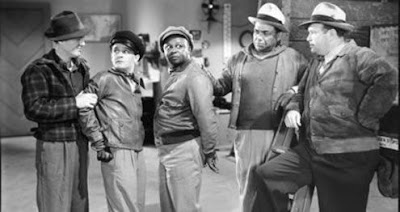The Gang's All Here (1941)
Starring: Frankie Darro, Mantan Moreland, Marcia Mae Jones, Jackie Moran, Keye Luke, and Laurence Criner
Director: Jean Yarbrough
Rating: Five of Ten Stars
An unemployed truck driver, Frankie (Darro), and his friend Jeff (Moreland) take a job with a company who's deliveries are being targeted by hijackers. Luckily for them, Frankie is too stubborn to become a victim.
If there ever was a film that lacks focus, it's "The Gang's All Here". The story (which involves brutal hijackings and murder in the service of a plot that puts what could have been a sympathetic character squarely in the corner with the purely evil villains) is one that belongs in a thriller or crime drama, not a film populated by comedians laughing it up.
Speaking of the comedians, there is very little humor here that modern viewers will find funny, as it's mostly based around negative racial stereotypes about black people. I believe this to be a near-certainty, because, unlike other films featuring Mantan Moreland and Frankie Darro, the racist humor isn't turned on its head and made subversive by the fact that Moreland's characters have tended to be the smartest in the films... and if Darro (or anyone else really) paid attention to him, things would never get as bad they do. However, in "The Gang's All Here", Moreland and the other black character that appears in the film--his evil counterpart that's working for the bad guys (played by Laurence Criner)--are just as slow-witted and lazy as the characters around them assume they are. Even the relationship between Darro and Moreland's characters feels off in this one, with Moreland never rising above anything but subservience to Darro.
It doesn't help the film that Darro's character is something of a dimwit himself who is easily provoked by insults or tricked with flattery due to a severe case of Short Man Syndrome. Between Moreland and Darro's characters, we have a pair of dullards as the heroes.. comedic stereotypes who have somehow wandered into the spots where a tough guy and a comic relief sidekick should have been. Interestingly, though, the total inappropriateness of Darro and Moreland's characters for the story they're in ends up elevating an otherwise very minor character to role of the story's ultimate hero: an unassuming Chinese man (played by Keye Luke) who appears to be just hanging around to learn the trucking business. Like a couple other characters, he has secrets that come out in the course of the film, Unlike the two black characters, while Luke's character is partly played for laughs, and partly presented as being smarter than Darro and Moreland combined, he is never presented as a negative stereotype... and this also helps him fill the vacuum left by the absence of a hero.
For all its flaws, however, "The Gang's All Here" still delivers a tightly plotted and swiftly paced thriller (however accidental it may be), which is not the case for many Monogram productions that set out to be thrilling and instead ended up boring. If you can see past the racist humor, and if you've liked Darro, Moreland, and/or Luke in other films, I think you might find this one worth you time. (Not as worth-your-time as
"Up in the Air",
"On the Spot", or even
"You're Out of Luck", but I don't think it will disappoint.)

































.jpg)
